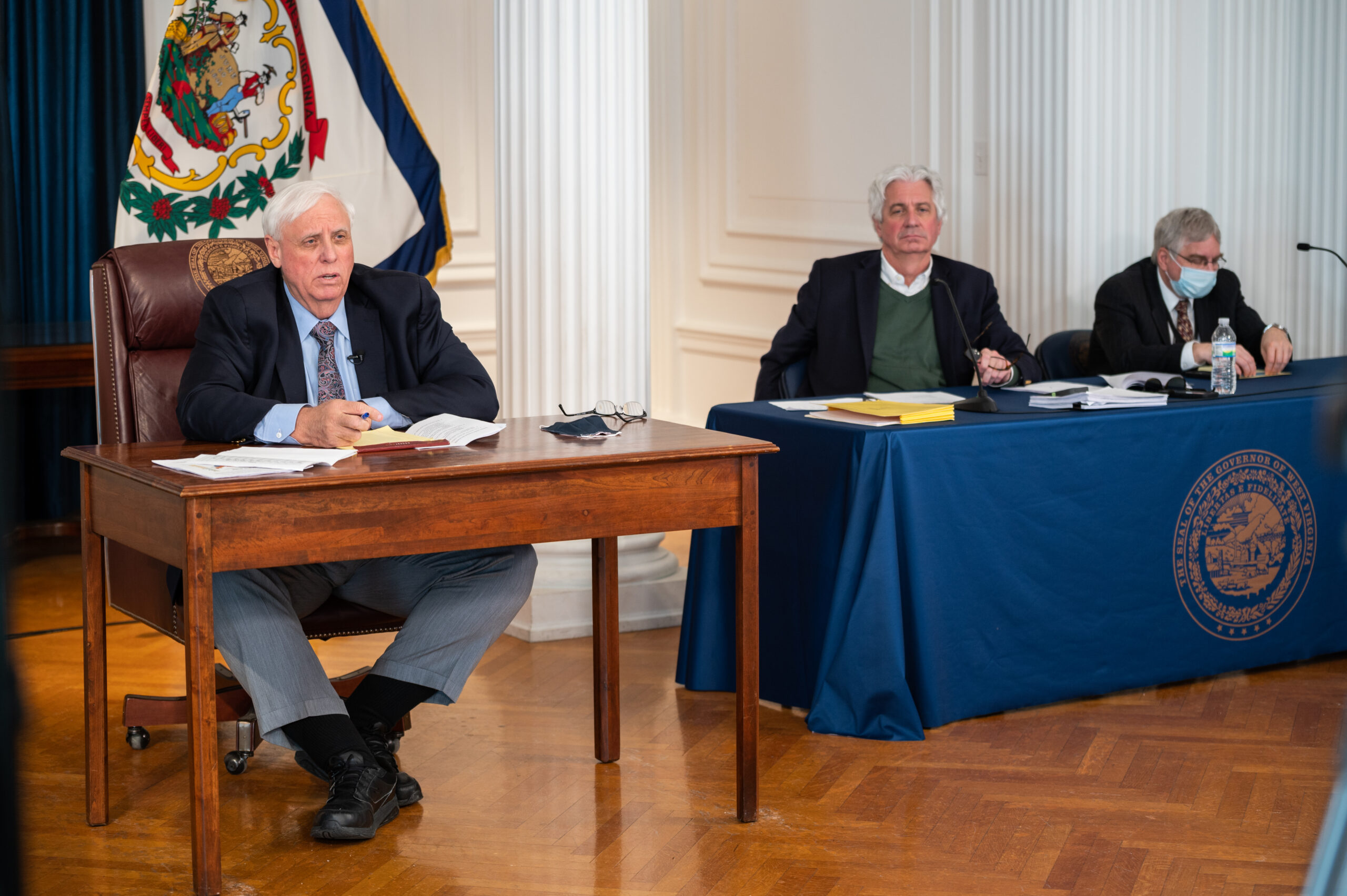MORGANTOWN – Gov. Jim Justice unveiled his plan to eliminate the state personal income tax Thursday and held another virtual town hall to sell his plan Friday.
He opened by saying the nation’s population has doubled since 1950 while West Virginia’s has shrunk by about 500,000. A population growth map he points to regularly shows West Virginia as the only red state.
“This will be the driver that drives folks to West Virginia,” he said of his plan.
He delivered his bill to the Legislature Thursday but it hasn’t been introduced yet. He’s made a copy of the bill and a summary abstract publicly available.
The bill will eliminate 60% of the personal income tax – about $1.035 billion – effective Jan. 1, 2022. Also, people earning $35,000 or less per year will get income-based rebates totaling $52 million.
It’s been known Justice was eyeing a variety of tax hikes to make up most of the loss and the bill spells them out.
The state sales tax will rise from 6% to 7.9%, including on mobile homes, generating $475 million.
Adding an array of professional services – legal, accounting and more – along with taxing computer hardware and software, health and fitness memberships, lottery tickets and other items will raise $180 million.
Smoking and drinking will cost a lot more under this plan. The cigarette tax goes from $1.20 a pack to $2.50. The tax on other tobacco, such as chew, goes from 12% of wholesale to 19.5%. Vape liquid tax will be 10 times higher, going from 7.5 cents per milliliter to 75 cents per milliliter.
One town hall caller said vaping has helped him stay off tobacco and this will be punitive. It takes about 100 milliliters of liquid to equal two packs, and the tax for that will soar from $7.50 to $75.
These three taxes are projected to raise $86.2 million.
Beer tax will be five times higher, from $5.50 a barrel to $29.25. Wine tax climbs four times, from $1 a gallon to $4, about an extra 80 cents a bottle.
Wholesale liquor will go from 28% to 39.25%.
The higher booze taxes will raise $36.9 million.
Coke, Dr Pepper and Dew will cost more too. The soda tax will go from 1 cent per 16.9 ounces to 6 cents (about 51 cents per 12 pack); soft drink syrup from 80 cents to $4 per gallon and dry mixes (like Kool-Aid) from 1 cent per 28.35 grams to 5 cents (a single pack of Kool-Aid is about 3.6 grams).
The total for this is $62.5 million.
Justice’s scaled luxury tax is projected to raise $20 million. It will apply to such things as jewelry, clothing, artworks, clocks, motor homes, snowmobiles, ATVs, yachts, airplanes and collections. It starts at 3% for luxury items $5,000 and up then notches downward at $10,000, $30,000, $100,000, $500,000 and $1 million. The luxury tax on items above $1 million will be 1%.
Justice also proposes a price-based tier system for the severance tax on coal and natural gas.
The combined hikes would total a projected $902.6 billion – about $185 million less than combined tax cut and rebates.
Many of the questions have been redundant from town hall to town hall and even within a town hall. Many believe the tax hikes will disproportionately affect lower-income residents.
Justice said several times Friday that people need to let go that idea. “Do you really think Jim Justice would do anything detrimental to our people that are struggling the most?”
One of his charts shows how the tax hikes, tax cut and rebates will affect various income levels. A household earning $10,000, with a $350 rebate, would see a net benefit of $258. A $35,000 household with a $50 rebate would net positive at $460. A $50,000 household would gain $799 and a $100,000 household, $2,458.
The gains are a bit less for a smoking/drinking/lottery household: $166 at $10,000; $310 at $35,000; $632 at $50,000; $2,239 at $100,000.
Several asked about property taxes and Justice said that was considered and ruled out.
Revenue Secretary Dave Hardy clarified confusion over professional service taxes for out-of-state businesses that do business here and in-state businesses that do business out of state. Out-of-state businesses would be taxed only on services performed in Wet Virginia. In-state businesses would not be taxed for services performed in other states.
One person asked how Justice can call his plan an income tax repeal when it leaves 40% untouched. Justice said that keeping a relatively flat state budget and relying on growth should allow the rest to be eliminated in a relatively short time – he hopes for three years but it could be four.
He’d be open, he said, to legalizing recreational marijuana if the Legislature would devote the tax revenue to further lowering the personal income tax.
Justice said he’s been talking with legislators in both houses on both sides of the aisle. He was in a meeting with Democrat senators and delegates just before Friday’s town hall.
“I’m very optimistic that everyone is going to understand that a no vote is telling people we do not want you to have more money in your pocket and we do not want you to have more opportunities than you do today,” he said, “If this thing fails, for whatever the reason may be, we’ll all lose.”
Tweet David Beard@dbeardtdp Email dbeard@dominionpost.com




